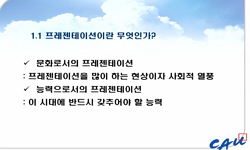In this study, we investigated the positive effect of experienced compassion among members on their psychological attitudes and behaviors. Compassion includes understanding feelings about suffering or gaining sympathy from others within a team and get...
http://chineseinput.net/에서 pinyin(병음)방식으로 중국어를 변환할 수 있습니다.
변환된 중국어를 복사하여 사용하시면 됩니다.
- 中文 을 입력하시려면 zhongwen을 입력하시고 space를누르시면됩니다.
- 北京 을 입력하시려면 beijing을 입력하시고 space를 누르시면 됩니다.
https://www.riss.kr/link?id=A99640178
- 저자
- 발행기관
- 학술지명
- 권호사항
-
발행연도
2013
-
작성언어
-
- 주제어
-
KDC
325
-
등재정보
KCI등재
-
자료형태
학술저널
- 발행기관 URL
-
수록면
41-74(34쪽)
-
KCI 피인용횟수
40
- 제공처
- 소장기관
-
0
상세조회 -
0
다운로드
부가정보
다국어 초록 (Multilingual Abstract)
222 employees and their supervisors were participated to the study. Employees responded their perception of compassion and affective commitment, and their supervisors rated employees’ job performance. Structural equation analysis was employed to examine the hypotheses. The following is a summary of the results. First, compassion was positively related to affective commitment. In other words, the higher perception of compassion, the higher affective commitment. Second, affective commitment was positively associated to job performance. Specifically, affective commitment has a positive impact on employees’ task performance, interpersonal facilitation and job dedication. Third, affective commitment was empirically mediated the relationship between compassion and job performance. Based on these findings, we conclude that the experienced compassion accompanied by specific actions through the emotional responses from others is a significant antecedent of affective commitment. Therefore, the results of the study emphasizes importance of compassion in the organization, efforts to support compassionate culture and need of training compassionate leaders or managers to encourage members.
In this study, we investigated the positive effect of experienced compassion among members on their psychological attitudes and behaviors. Compassion includes understanding feelings about suffering or gaining sympathy from others within a team and getting psychological and material assistance. Thus, we proposed that compassion influence on the process of employees' psychological attitude and behavior. The purpose of this study is to verify (1) compassion has an influence on affective commitment;(2) affective commitment has an influence on the job performance(task performance, interpersonal facilitation, job dedication); and (3) affective commitment has a mediating effect on the relationship between compassion and employee’s job performance.
222 employees and their supervisors were participated to the study. Employees responded their perception of compassion and affective commitment, and their supervisors rated employees’ job performance. Structural equation analysis was employed to examine the hypotheses. The following is a summary of the results. First, compassion was positively related to affective commitment. In other words, the higher perception of compassion, the higher affective commitment. Second, affective commitment was positively associated to job performance. Specifically, affective commitment has a positive impact on employees’ task performance, interpersonal facilitation and job dedication. Third, affective commitment was empirically mediated the relationship between compassion and job performance. Based on these findings, we conclude that the experienced compassion accompanied by specific actions through the emotional responses from others is a significant antecedent of affective commitment. Therefore, the results of the study emphasizes importance of compassion in the organization, efforts to support compassionate culture and need of training compassionate leaders or managers to encourage members.
참고문헌 (Reference)
1 심창현, "조직의 윤리 풍토와 조직 구성원 직무 결과간의 관계에 대한 교차수준 연구" 한국인사관리학회 37 (37): 117-150, 2013
2 서정하, "조직구성원의 직업불안정성이 정서적 몰입과 지속적 몰입에 미치는 영향에 관한 연구" 한국인사관리학회 31 (31): 117-147, 2007
3 홍계훈, "조직공정성과 회사의 심리적 계약위반의 인식이 조직몰입과 직무스트레스에 미치는 영향: 대안모델의 탐색" 한국인사관리학회 37 (37): 59-85, 2013
4 정홍술, "상사에 대한 신뢰 및 조직지원인식에 대한 조직공정성의 효과와 조직시민행동과의 관계" 한국인사관리학회 29 (29): 107-137, 2005
5 한광현, "변혁적 리더십과 조직시민행동의 관계에 있어서 리더만족, 과업만족,정서적 몰입의 매개역할" 22 (22): 169-197, 1998
6 Muse, L., "Work-life benefits and positive organizational behavior : is there a connection?" 29 : 171-192, 2008
7 Kidron, A., "Work values and organizational commitment" 21 : 239-247, 1978
8 Frost, P. J., "Why compassion counts" 8 : 127-133, 1999
9 Batson, C. D., "Why act for the public good? Four answers" 20 : 603-610, 1994
10 Goleman, D., "What makes a leader?" 76 (76): 93-102, 1998
1 심창현, "조직의 윤리 풍토와 조직 구성원 직무 결과간의 관계에 대한 교차수준 연구" 한국인사관리학회 37 (37): 117-150, 2013
2 서정하, "조직구성원의 직업불안정성이 정서적 몰입과 지속적 몰입에 미치는 영향에 관한 연구" 한국인사관리학회 31 (31): 117-147, 2007
3 홍계훈, "조직공정성과 회사의 심리적 계약위반의 인식이 조직몰입과 직무스트레스에 미치는 영향: 대안모델의 탐색" 한국인사관리학회 37 (37): 59-85, 2013
4 정홍술, "상사에 대한 신뢰 및 조직지원인식에 대한 조직공정성의 효과와 조직시민행동과의 관계" 한국인사관리학회 29 (29): 107-137, 2005
5 한광현, "변혁적 리더십과 조직시민행동의 관계에 있어서 리더만족, 과업만족,정서적 몰입의 매개역할" 22 (22): 169-197, 1998
6 Muse, L., "Work-life benefits and positive organizational behavior : is there a connection?" 29 : 171-192, 2008
7 Kidron, A., "Work values and organizational commitment" 21 : 239-247, 1978
8 Frost, P. J., "Why compassion counts" 8 : 127-133, 1999
9 Batson, C. D., "Why act for the public good? Four answers" 20 : 603-610, 1994
10 Goleman, D., "What makes a leader?" 76 (76): 93-102, 1998
11 Fredrickson, B. L., "What good are positive emotions in crises? A prospective study of resilience and emotions following the terrorist attacks on the Inited States on September 11, 2001" 84 : 365-376, 2003
12 Sosik, J. J., "Understanding leader emotional intelligence and performance: The role of self-other agreement on transformational leadership perception" 24 (24): 475-493, 1999
13 Frost, P. J., "Toxic emotions at work: How compassionate managers handle pain and conflict" Harvard Business School Press 2003
14 Holmbeck, G. N., "Toward terminological, conceptual, and statistical clarity in the study of mediators and Moderators: examples from the child-clinical and pediatiric psychology literatures" 65 (65): 599-610, 1997
15 Orr, J. M., "The role of prescribed and non-prescribed behavior in estimating the dollar value of performance" 74 : 34-40, 1989
16 Ogilvie, J. R., "The role of human resource management practices in predicting organizational commitment" 11 : 335-359, 1986
17 Dalai Lama., "The power of compassion" Thorsons 1995
18 Luthans, F., "The need for and meaning of positive organizational behavior" 23 (23): 695-, 2002
19 Soloman, R. C., "The moral psychology of business: Care and compassion in the corporation" 8 : 515-533, 1998
20 Baron, R. M, "The moderator-mediator variable distinction in social psychological research: Conceptual, strategic, and statistical consideration" 51 : 1173-1182, 1986
21 Hallowell, E. M., "The human moment at work" 77 : 58-66, 1999
22 Miller, J. B., "The healing connection : How women form relationships in therapy and life. Boston" Beacon Press 1997
23 Davis, M. H., "The effects of dispositional empathy on emotional reactions and helping:A multidimensional approach" 51 : 167-184, 1983
24 Lilius, J. M., "The contours and consequences of compassion at work" 29 : 193-218, 2008
25 O'Reilly, C. A., "The commitment and job tenure of new employees: Some evidence of postdecisional justification" 26 : 597-616, 1981
26 Lerner, M. J., "The belief in a just world : A fundamental delusion. New" New York: Plenum 1980
27 Rinpoche, S., "The Tibetan book of living and dying" Rider Books 1992
28 Soygal, R., "The Tibetan book of living and dying" Rider Books 1992
29 Harvey, J. H., "The Psychology of loss as a lens to a positive psychology" 44 : 838-853, 2001
30 Steiger, J. H., "Structural model evaluation and modification: an interval estimation approach" 25 : 173-180, 1990
31 Reich, W. T., "Speaking of suffering: A moral account of compassion" 72 : 83-108, 1989
32 Frost, P. J., "Seeing organizations differently : Three lenses on compassion. In C. Hardy, S. Clegg, T. Lawrence, & W. Nord(Eds. ), Handbook of organization studies, 2nd ed : 843-866" Sage 843-866, 2006
33 Morrison, E. W., "Role definitions and organizational citizenship behavior: The importance of the employee's perspective" 37 : 1543-1567, 1994
34 Kahn, W. A., "Relational systems at work. In B. M. Staw, & L. L. Cummings(Eds.), Research in organizational behavior , Vol. 20, 39-76" Elsevier Science 39-76, 1998
35 Brief, A. P., "Prosocial organizational behaviors" 11 : 710-725, 1986
36 Glisson, C, "Predictors of job satisfaction and organizational commitment in human service organization" 33 : 61-81, 1988
37 Cameron, K., "Positive organizational scholarship, San" Berrett-Koehler Publishers 2003
38 Folkman, S., "Positive affect and the other side of coping" 55 : 647-654, 2000
39 Davis, M. H., "Personality and empathic accuracy. In W. J . Ickes(Ed.), Empathic accuracy, 144-168" Guilford Press 144-168, 1997
40 Findley, H. M., "Performance appraisal process and system facets: Relationships with contextual performance" 85 : 634-640, 2000
41 Eisenberger, R. E., "Perceived organizational support and employee diligence, commitment, and innovation" 75 (75): 51-59, 1990
42 Eisenberger, R., "Perceived organizational support" 71 : 500-507, 1986
43 Luthans, F., "Organizational commitment: Analysis and antecedents" 40 : 219-236, 1987
44 Organ, D. W., "Organizational citizenship behavior: The good soldier syndrome" Lexington 1988
45 Smith, C. A., "Organizational citizenship behavior: Its nature and antecedents" 68 (68): 653-663, 1983
46 Organ, D. W., "Organizational citizenship behavior: It's construct clean-up time" 10 : 85-97, 1997
47 Molinsky, A., "Necessary evils and interpersonal sensitivity in organizations" 30 : 245-268, 2005
48 Frost, P. J., "Narratives of compassion in organizations. In S. Fineman(Ed. ), Emotion in organizations, 25-45" Sage 2000
49 Hair, J. F., "Multivariate Data Analysis, 6th ed" Prentice-Hall International 2006
50 Clark, C., "Misery and company : Sympathy in everyday life. Chicago" The University of Chicago Press 1997
51 0Meyer, J. P., "Links between work experiences and organizational commitment during the first year of employment: A longitudinal analysis" 61 : 195-209, 1988
52 Hughs, M. A., "Linking theory construction and theory testing: Models with multiple indicators of latent variables" 11 : 128-144, 1986
53 Dutton, J. E., "Leading in times of trauma" 54-61, 2002
54 Williams, L. J., "Job satisfaction and organizational commitment as predictors of organizational citizenship and in-role behavior" 17 : 601-617, 1991
55 Van Scotter, J. P, "Interpersonal facilitation and job dedication as separate facets of contextual performance" 81 : 525-531, 1996
56 Hoyle, R. H., "Formulating clinical research hypotheses as structual equation models-a conceptual overview" 62 (62): 429-440, 1994
57 Allen, T. D., "Family supportive work environments: The role of organizational perceptions" 58 : 414-435, 2001
58 Church, A. T., "Exploratory and confirmatory tests of the big five and Tellegen's three-and-four dimensional models" 66 : 93-114, 1994
59 Dutton, J. E., "Explaining compassion organizing" 51 : 59-96, 2006
60 Borman, W. C., "Expanding the criterion domain to include elements of contextual performance. In N. Schmitt, & W. C. Borman(Eds.), Personnel selection in organizations, 71-98" Jossey-Bass 71-98, 1993
61 Motowidlo, S. J., "Evidence that task performance should be distinguished from contextual performance" 79 : 475-480, 1994
62 Fornell, C, "Evaluating structual equation models with unobservable variables and measurement error" 18 : 39-50, 1981
63 Dutton, J. E., "Energize your workplace: How to build and sustain high-quality connections at work" Jossey-Bass 2003
64 Mowday, R. T., "Employee-organization linkages" Academic Press 1982
65 Salovey, P, "Emotional intelligence. Imagination" 9 : 185-211, 1990
66 Wolff, S. B., "Emotional intelligence as the bases of leadership emergence in self-managing teams" 13 : 505-522, 2002
67 Van Scotter, J. P., "Effects of task performance and contextual performance on systematic rewards" 85 : 526-535, 2000
68 Brooke, P. P., "Discriminant validity of measures of job satisfaction, job involvement, and organizational commitment" 73 : 139-145, 1988
69 Boyatzis, R. E., "Developing sustainable leaders through coaching and compassion" 5 (5): 8-24, 2006
70 Batson, C. D., "Current status of the empathy-altruism hypothesis. In M.S. Clark(Ed.), Prosocial behavior: Review of Personality and Social Psychology, Vol. 12: 62-85" Sage 62-85, 1991
71 Miller, K. I., "Compassionate communication in the workplace: Exploring processes og noticing, connecting, and responding" 35 : 223-245, 2007
72 Von Dietze, E., "Compassionate care : A moral dimension of nursing" 7 : 166-174, 2000
73 Cassell, E. J., "Compassion. In C. R. Snyder & S. J. Lopez(Eds.), Handbook of positive psychology, 434-445" Oxford University Press 434-445, 2002
74 Kanov, J. M., "Compassion in organizational life" 47 : 808-827, 2004
75 Sears, D., "Compassion for humanity in the J ewish tradition" Jason Aronson 1998
76 Nussbaum, M. C., "Compassion : The basic social emotion" 13 : 27-58, 1996
77 Meyer, J. P., "Commitment to organizations and occupations: Extension and test of a three-component conceptualization" 78 : 538-551, 1993
78 Dubin, R., "Central life interests and organizational commitment of blue-collar and clerical workers" 20 : 411-421, 1975
79 Kahn, W. A., "Caring for the caregivers : Patterns of organizational caregiving" 38 : 539-563, 1993
80 Cialdini, R. B., "Basking in reflected glory : Three(football)field studies" 34 : 366-375, 1976
81 O'Driscoll, M. P., "Attitudes to the job and the organization among new recruits: Influence of perceived job characteristics and organization structure" 36 : 133-145, 1987
82 Cohen, J., "Applied Multiple Regression/Correlation Analysis for the Behavioral Sciences(2nd ed. )," Lawrence Erlbaum Associates 1983
83 Steers, R. M., "Antecedents and outcomes of organizational commitment" 22 : 46-56, 1977
84 배병렬, "Amos 17.0 구조방정식 모델링" 청람출판 2009
85 Zellars, K. L., "Affective personality and the content of emotional social support" 86 : 459-467, 2001
86 Weiss, H. M., "Affective events theory : A theoretical discussion of the structure, causes, and consequences of affective experiences at work. In B. M. Staw, & L. L. Cummings(Eds. ), Research in Organizational Behavior, Vol. 18, 1-74. New" Elsevier Science 1-74, 1996
87 Rhoades, L., "Affective commitment to the organization: The contribution of perceived organizational support" 86 : 825-836, 2001
88 Wuthnow, R., "Acts of compassion : Caring for others and helping ourselves. Princeton" Princeton University Press 1991
89 Meyer, J. P., "A three-component conceptualization of organizational commitment" 1 : 61-89, 1991
90 Morris, J. H, "A second look at need for achievement and need for autonomy as moderators of role perception-outcome relationships" 64 : 173-178, 1979
91 Mathieu, J. E., "A review and meta-analysis of the antecedents, correlates and consequenced of organizational commitment" 108 (108): 171-194, 1990
92 DeCotiis, T. A., "A path analysis of a model of the antecedents and consequences of organizational commitment" 40 : 445-470, 1987
동일학술지(권/호) 다른 논문
-
- 한국인사관리학회
- 한태영(Han Tae Young)
- 2013
- KCI등재
-
노동조합의 전략적 참여와 사업장내 노사협의회 활성화에 관한 실증연구
- 한국인사관리학회
- 이동진(Lee Dong-Jin), 이영면(Lee Young-Myon), 성상현(Sung Sang-Hyun)
- 2013
- KCI등재
-
진성 리더십이 심리적 웰빙과 팀 성과에 미치는 영향에 관한 연구
- 한국인사관리학회
- 정예지(Jeong Yejee), 김문주(Kim. Moon-Joo)
- 2013
- KCI등재
-
- 한국인사관리학회
- 곽원준(Kwak Won jun)
- 2013
- KCI등재
분석정보
인용정보 인용지수 설명보기
학술지 이력
| 연월일 | 이력구분 | 이력상세 | 등재구분 |
|---|---|---|---|
| 2026 | 평가예정 | 재인증평가 신청대상 (재인증) | |
| 2020-01-01 | 평가 | 등재학술지 유지 (재인증) |  |
| 2017-01-01 | 평가 | 등재학술지 유지 (계속평가) |  |
| 2013-01-01 | 평가 | 등재학술지 유지 (등재유지) |  |
| 2010-02-26 | 학회명변경 | 영문명 : The Korean Association Of Personnel Administration -> Korean Academy of Organization and Management |  |
| 2010-02-26 | 학술지명변경 | 한글명 : 인사관리연구 -> 조직과 인사관리연구외국어명 : The Korean Personnel Administration Journal -> Journal of Organization and Management |  |
| 2010-01-01 | 평가 | 등재학술지 유지 (등재유지) |  |
| 2008-01-01 | 평가 | 등재학술지 유지 (등재유지) |  |
| 2005-01-01 | 평가 | 등재학술지 선정 (등재후보2차) |  |
| 2004-01-01 | 평가 | 등재후보 1차 PASS (등재후보1차) |  |
| 2002-07-01 | 평가 | 등재후보학술지 선정 (신규평가) |  |
학술지 인용정보
| 기준연도 | WOS-KCI 통합IF(2년) | KCIF(2년) | KCIF(3년) |
|---|---|---|---|
| 2016 | 2.35 | 2.35 | 2.29 |
| KCIF(4년) | KCIF(5년) | 중심성지수(3년) | 즉시성지수 |
| 2.36 | 2.41 | 4.335 | 0.59 |




 스콜라
스콜라







